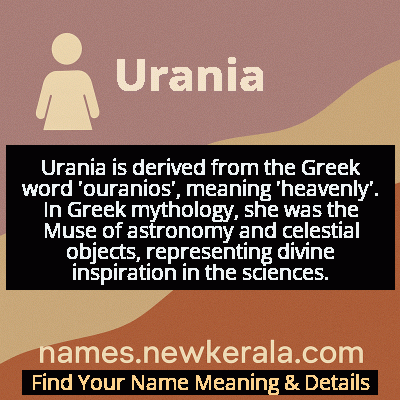Urania Name Meaning & Details
Origin, Popularity, Numerology Analysis & Name Meaning of Urania
Discover the origin, meaning, and cultural significance of the name URANIA. Delve into its historical roots and explore the lasting impact it has had on communities and traditions.
Name
Urania
Gender
Female
Origin
Greek
Lucky Number
1
Meaning of the Name - Urania
Urania is derived from the Greek word 'ouranios', meaning 'heavenly'. In Greek mythology, she was the Muse of astronomy and celestial objects, representing divine inspiration in the sciences.
Urania - Complete Numerology Analysis
Your Numerology Number
Based on Pythagorean Numerology System
Ruling Planet
Sun
Positive Nature
Leaders, ambitious, highly driven, self-reliant, innovative.
Negative Traits
Overly aggressive, domineering, impatient, selfish.
Lucky Colours
Red, orange, gold.
Lucky Days
Sunday.
Lucky Stones
Ruby, garnet.
Harmony Numbers
2, 3, 9.
Best Suited Professions
Entrepreneurs, managers, engineers.
What People Like About You
Courage, determination, leadership.
Famous People Named Urania
Urania of Athens
Ancient Greek Muse
Patron of astronomy and celestial writings in Greek mythology
Urania Bailey
American astronomer
19th century female astronomer who popularized astronomical knowledge
Urania Cottage
Philanthropic institution
Charles Dickens' home for fallen women, representing moral and intellectual elevation
Urania St. Clair
Fictional character
Intellectual character in George Eliot's 'Middlemarch' symbolizing aspiration
Name Variations & International Equivalents
Click on blue names to explore their detailed meanings. Gray names with will be available soon.
Cultural & Historical Significance
The Renaissance witnessed Urania's revival as humanists rediscovered classical texts and sought to reconcile Christian theology with emerging scientific understanding. Poets and astronomers alike invoked her name, seeing no contradiction between religious faith and astronomical discovery. In the 18th and 19th centuries, Urania became a symbol of the Enlightenment's faith in reason and progress, while Victorian reformers like Charles Dickens used her name for institutions aimed at social and moral improvement. This enduring cultural presence demonstrates how Urania has consistently represented humanity's highest intellectual and spiritual aspirations across different historical epochs.
Extended Personality Analysis
Those named Urania typically exhibit a unique blend of intellectual depth and spiritual awareness that sets them apart. They are natural philosophers who ponder life's big questions while maintaining practical intelligence. Uranias often display remarkable pattern recognition abilities, whether in scientific data, artistic compositions, or social dynamics. Their thinking tends to be both systematic and intuitive—they can analyze complex information while also grasping underlying principles and connections that others might miss. This makes them excellent problem-solvers in fields requiring both technical skill and creative insight.
Emotionally, Uranias are often deeply reflective individuals who value authenticity and meaningful connections. While they may appear reserved in social situations, this usually stems from their contemplative nature rather than shyness. They form strong, lasting relationships with people who appreciate their intellectual curiosity and share their interest in exploring ideas. Uranias typically have a strong sense of purpose and often feel driven to contribute something meaningful to the world. Their combination of analytical thinking, creative vision, and emotional depth makes them natural mentors and innovators who can bridge different ways of knowing and understanding.
Modern Usage & Popularity
In contemporary naming practices, Urania occupies a unique niche as a sophisticated choice that appeals to parents seeking both classical heritage and distinctive character. While statistical data shows it remains outside the top 1000 names in English-speaking countries, its usage has become more visible through cultural trends favoring mythological and celestial names. The name particularly resonates with families in academic, scientific, or artistic circles who appreciate its intellectual connotations and elegant phonetic qualities. Social media platforms and naming websites have contributed to its modern rediscovery, with many parents noting its appeal as an alternative to more common classical names like Athena or Diana. Current naming trends suggest Urania may experience gradual increased usage as parents continue seeking meaningful names with historical depth that stand out without being overly eccentric. Its association with astronomy and cosmic themes aligns well with contemporary interest in space exploration and scientific discovery.
Symbolic & Spiritual Meanings
Urania symbolizes humanity's eternal quest for cosmic understanding and the intersection between empirical observation and spiritual contemplation. As the celestial muse, she represents the idea that studying the heavens leads not only to scientific knowledge but also to philosophical insight and spiritual awakening. Symbolically, Urania embodies the concept of 'as above, so below'—the ancient belief that cosmic patterns reflect earthly realities and vice versa. She represents the bridge between measurable reality and metaphysical truth, reminding us that true wisdom requires both rational analysis and intuitive understanding.
Metaphorically, Urania serves as a guiding star for intellectual and spiritual seekers—she represents the inner light that illuminates dark corners of ignorance and the compass that points toward higher understanding. In psychological terms, she symbolizes the integration of left-brain analytical thinking with right-brain creative insight, suggesting that complete knowledge requires both approaches. Her symbolism extends to concepts of perspective and scale—the ability to see both the minute details and the grand patterns, to understand how individual elements relate to universal principles. This makes Urania a powerful symbol for our times, representing the need to balance technological advancement with philosophical reflection and scientific discovery with ethical consideration.

